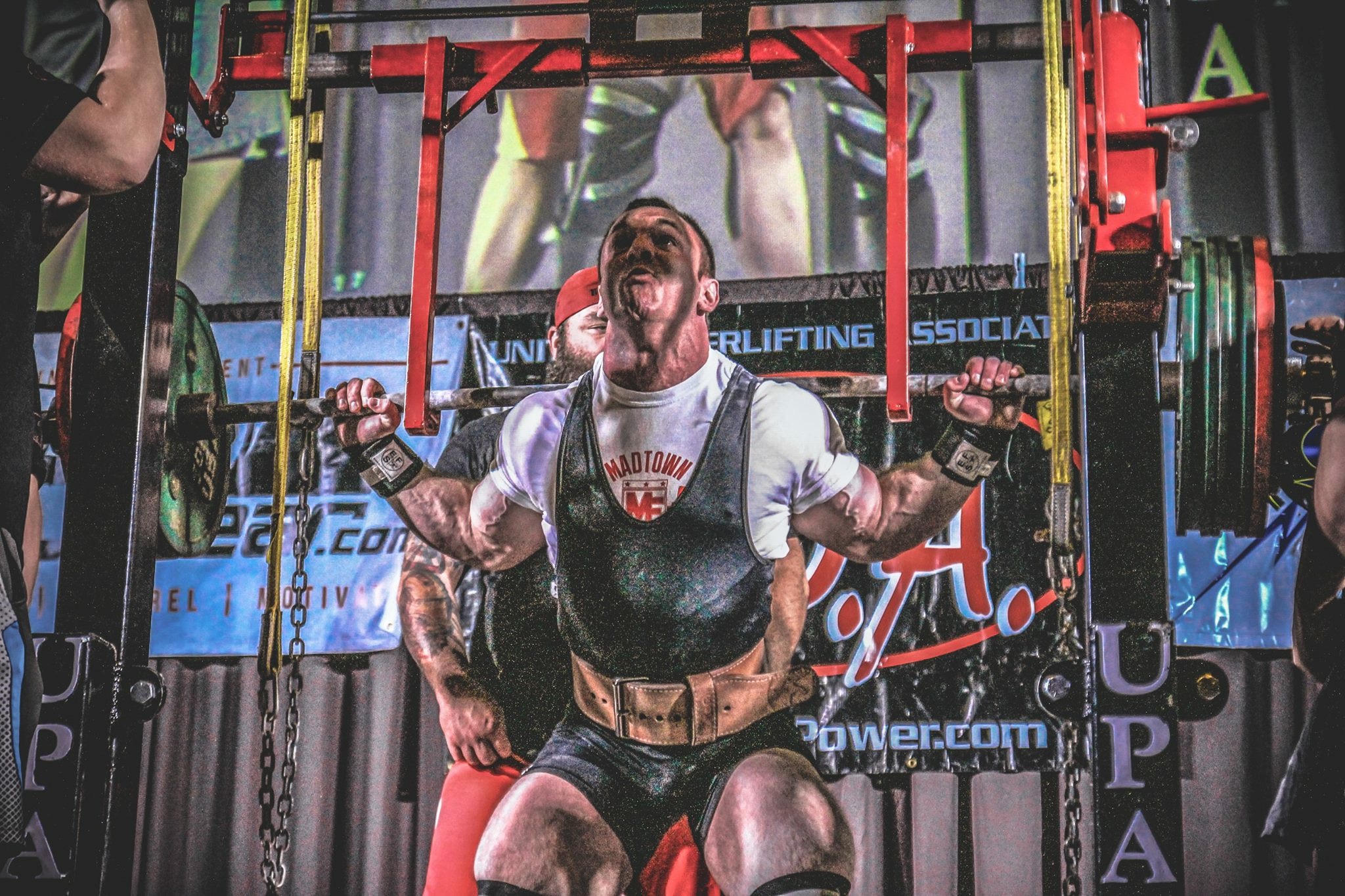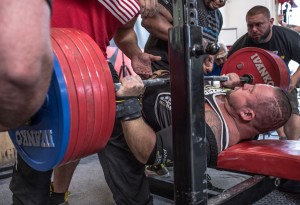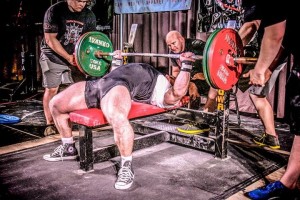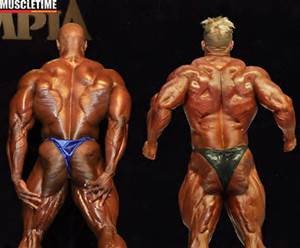
20 May 7 Reasons Why Every Bodybuilder Should Do a Powerlifting Routine
1.Stronger=Bigger
Let’s face it; a stronger muscle is a bigger muscle. I took some time away from focusing on hypertrophy work and really hammered the big 3. What happened? I grew. The switch up for my body was enough of a shock it was forced to put on tissue to help sustain the extra weight I was pushing. Depending on your level of development as a bodybuilder, the strength work will directly affect you to different degrees. A novice will grow like a weed because anything will make him or her grow. An advanced level bodybuilder will get something from the switch up, but not nearly as much as a beginner. Why bother then if you’re already at an advanced stage of muscle development? It’s the after effects that will make it all worth it. Let’s say you’re a bodybuilder who can rep 315 lbs 10 times or so on bench, and you’ve never focused on strength. If you do a strength program, your numbers are going to shoot up. When you come back to hypertrophy training after that, and you’re pushing 335 or 345 for sets of 10, you’re going to blow up quick. You got some degree of growth directly from switching to sets of 5’s, triples and the occasional singles, but coming back after adding all that extra strength to your body will help you push through both strength and growth plateaus.
2. Better understanding of CNS
To be successful in bodybuilding or powerlifting, you have to learn your body and figure out what works for you. The better you can expand your knowledge of your body the better armed you are to achieve the goals you’ve set out. The CNS can be a tricky thing. I see a lot of people walking around totally over trained and being too stubborn to realize it. It can be tough in bodybuilding because your focus is on the pump and how the weight feels, rather than what you put up for how many reps that day. Over training can quietly sneak up on you and slow those gains to a halt, or really hamper fat loss while you’re dieting. There’s nothing like being hungry and tired and wanting that fat loss to come, and being stagnant for a while until you realize it’s time to back off… And then presto – you wake up leaner and fuller a day or two later. Powerlifting will teach you about whole different side of the CNS, and its subtleties will become much easy to read. When you’re analyzing your progress each day by how the weight felt and moved, it’s very easy to see almost immediately when the weight starts to feel heavy for more than a session or two that your CNS is getting spent…. Hopefully you used the 1020life template and are not over trained or injured, but if you’re using one of those RPE 9 every day for 10 weeks straight without a deload programs it’ll catch up to you pretty quick. A lot of people get tired and worn out and just keep pushing to no avail. When 405 was still one of your lighter warmup sets a couple weeks ago, and now it feels like it’s going to take you down to the ground with it, you’ll learn something very quick. Muscles are broken down in the gym, and built in the kitchen and the bedroom. Powerlifting can provide a great lesson on this subject.
3. Improved mind muscle connection
As bodybuilders, we usually take pride in our awesome mind-muscle connection ability. We can make weight feel heavy and isolate muscles and contract to pump and grow. But making weight feel light and learning how to be strong will yield a whole new set of mind muscle connectivity. Ironically enough, having to learn to set my shoulders and contract my lats on bench presses showed me a ton of new areas I hadn’t yet developed in my back, as well as helping me feel my chest better. Learning how to use your whole body during a lift is just as useful as learning how to use one muscle at a time. We all know that big pecs were built from bench presses and big legs were built from squats. Pec flys never made anyone’s chest humongous, just like leg extensions were never the key movement to giving someone an amazing set of wheels. Those movements certainly have a place, but they aren’t the bread and butter like the big movements are. Learning how to turn your body into a machine and work as a system, rather than compartmentalized and isolating will directly translate to your bodybuilding training in an awesome way.
4. Being strong is cool
Let’s be honest, being strong is sweet. I didn’t put any emphasis on strength for the longest time. I made decent gains, and I was decently strong, but when someone half your size is warming up with your max, it’s a shitty feeling. Once I started putting an emphasis on getting the Big 3 stronger, things started moving a lot better for me. Besides the increased confidence of putting 50 lbs on your bench and 100 lbs on your squat and deadlift, it just feels good to have your strength match your physique. You look like you’re strong…. You might as well be strong too. There’s no reason to walk around like a big fluffy muscle creature that really has no practical purpose. I’ve met dudes who are seriously yoked, but could only get a handful of good reps at 405 on squats. I was terrified that might be me someday so I found a powerlifting gym as soon as I could. Hitting a triple bodyweight squat on the platform is a pretty nice feeling, and brings its own satisfaction just like being peeled and dry on stage does.
5. Being an Authority on Technique
Being knowledgeable about what I’m doing in the gym and how I am teaching people to lift has always been important. There are a million people slinging around weights and doing it improperly and just waiting for an injury. I must confess, I too was one of those guys. I didn’t sling it haphazardly, but my technique sucked. I had a shoulder injury since I played football in high school, and never really learned how to bench properly. All I ever heard was pull your shoulders back – a lot of good that did me. I was basically on my own to figure out technique for the big movements, and as a result my deadlift was atrocious, my bench hurt every time and my squat was decent but my lower back always hurt after going heavy. Learning proper technique became much more important to me once I started training people myself. You don’t want to be giving out bad information to your clients. To most bodybuilders, good technique is just feeling the muscle, and that was a lot of the advice I got from people around me. A pretty typical response from a bodybuilder about technique is “Well do you feel it in X spot?…. then yeah that’s right.” Powerlifting intrigued me because there was a certain uniformity surrounding technique. I wanted the keys to be able to do everything in the gym without worrying about being hurt, and I wanted to be able to pass on healthy tips to my clients that weren’t just opinion based from my own experience. Understanding the uniformity of powerlifting techniques for the big 3 gave me a feeling of authority and edification to the advice I was giving, and that confidence transfers well when teaching other people and training yourself.
6. Injury Prevention
Would you believe that I actually came out of a year of powerlifting with less injuries than when I was bodybuilding? A lot of this had to do with form and technique work, as well as the frequent deloads and intelligent use of intensity (10/20/life principles). I can also say, that I really felt like my body not only became stronger in the big 3 lifts, but more durable overall. Putting heavy weight on my back, picking it up or pressing it each week with smart form felt like it was strengthening everything, from my connective tissue to my core to my rotator cuffs etc. Another highlight of the 10/20/life is that core work and prehab are huge for beginning and ending a workout. Sure I could do crunches and leg lifts, but my core overall wasn’t ready for heavy weight on my back each week, and all the planks, bird dogs, stir the pots and McGill crunches were huge in keeping me strong and healthy.
7. More to talk about with Friends and family
Powerlifting is a little bit more relatable to regular people. Bodybuilding garners a lot more attention in terms of social media, magazine covers etc. But when you’re talking to the totally uninitiated, or the old school jock that just cares about sports performance, it’s tough to talk about bodybuilding. Example – Aunt Bonnie asks Tim how his weight lifting stuff has been going, Tim responds – “Great Aunt Bonnie, thanks for asking! I did really well at my bodybuilding show last week, and I’m prepping for another one two weeks from now! I’m happy with how I looked on stage, I really nailed my water loss and my glute lines really stood out!” Aunt Bonnie is mystified and isn’t sure what to think about her nephews rippling ass muscles. Now let’s talk powerlifting, same dialogue from Bonnie, Tim responds “Things are great! I did awesome at my meet last month. I’ve got another one coming up soon. I’ve had a lot of good help at the gym and my technique is really coming along, last month I deadlifted 600 lbs!” Bonnie – “Wow! 600 lbs! That’s great Tim, you’re getting so strong!”… Okay, sure, my version is a little bit hammed up, but it’s not far from the truth. I’ve been doing bodybuilding shows since high school. My mom loves the way I look up on stage, but how is she really supposed to tell people about it? “Tuck did great, his hamstrings and glutes finally didn’t hold any water and he won his weight class!”… There always seems to be a lack of things to talk about regarding how I felt the day of the show or during the prep. Yes, I could talk about my glute lines and quad separation, or all the fun new veins I discovered this prep, but I’ve talked about how lean my ass gets before and my older brother didn’t seem too interested. Can you blame him? Once I started having a real number that people can relate to – 400 lbs, 600 lbs, 800 lbs etc. People start to tune in more. You can have a good talk with regular people too about your accomplishments, and because it’s easier for them to access they feel more included in this side of your life. Just being able to talk about lifting with family and friends shouldn’t be a primary motivator for which one you choose, because hopefully your family and friends will support whatever route you go, but it was a pleasant surprise to be able to talk about my training and meet prep and have people tune in a little bit more than in the past.
Aunt Bonnie is less impressed with Ronnie’s glutes and more impressed with Franco’s dead lifts.
Latest posts by Tucker Loken (see all)
- Tucker: Another Normal Log Update - March 1, 2019
- Tucker: A Normal Log Update - February 16, 2019
- Tucker: Making Do - February 4, 2019









Sorry, the comment form is closed at this time.